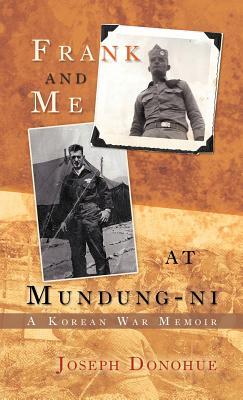Author: Joe Donohue Frank and Me at Mundung-Ni
Title: Frank and Me at Mundung-Ni
Publisher: iUniverse
ISBN: 978-1-4620-7283-5
Pages: 488, Paperback/Kindle/Hardcover
Genre: Memoirs
Author Interview with Joe Donohue
Author Interview with Joseph Donohue
Title: Frank and Me at Mundung-Ni
Reviewed by: Brandon Nolta, Pacific Book Review
The Korean War was clearly an important influence on your life. What long-term effects or character traits do you feel resulted from your experience?
This day I cringe when I see how war is glamorized and glorified in video games, movies, books, and television. To me it’s a great injustice that these producers project an unrealistic image of killing and maiming as behaviors that are both normal and acceptable for soldiers in war. Soldiers become hardened to war but often they suffer the consequences of fighting in the forms of mental breakdowns, traumatic stress, suicide, depression, and other related disorders. Unfortunately, it’s the very young, naive and psychologically immature who are often the ones most affected by these false depictions. I am revolted by this. It’s unrealistic and unfair to propagandize the horrors of war as heroic and grand entertainment to a gullible public.
What do you hope readers take away from your memoir with regard to that period of history?
I’d like readers to try and answer the question why the Korean War is often referred to as “The Forgotten War.” Why? I have my theories but I think that if the question was explored it would help people better understand the role that war plays in the history of our country in the world today.
Do you plan to write any more memoirs about your life and friendship with Frank? If so, what periods of time would you cover?
No. Frank and Me at Mundung-ni was a one-time only memoir covering the last two years of our service in the Korean War.
What haven’t you been asked that you wish had been?
I think there should have been a question as to: What motivated me to write this memoir?
This is a question I have asked myself many times. The easiest response would be to say that it was a promise to Frank in 1994 as a patient in a ward in a veteran’s hospital in Boston, which is true, but not the only reason.
The last year of the Korean War, from 1952 to 1953 was unique. It had become a stalemate. I wanted the reader to “feel” what it was like to be dug into the tops of mountains waiting for the negotiations at Panmounjom to end the fighting. What it was like to live and fight in rat infested trenches, engage a tough, relentless enemy, face constant shelling and the anxiety of combat patrols. Nobody wanted to be the last casualty of the Korean War. I wanted to share with the reader how I handled these trying moments physically, emotionally and psychologically.
I wanted to tell my story as I remembered it, so that my family and friends would have some understanding of what it was like to be a young soldier during the last year of the Korean War.
What book are you reading now?
I am currently reading the sequel to COUP D’ETAT; a Dewey Andreas novel entitled The Last Refuge. It’s about U.S and Israeli agents trying to stop Iran from exploding a nuclear bomb in Tel Aviv. It’s a real page turner.
What was the hardest part of writing your book?
Since I kept over 40 years of recorded tapes of my experiences during the Korean War, the hardest part was transcribing and then rewriting them in a way that would capture the authenticity of voice, mannerisms and behaviors of 20 year old New York City kids who got drafted for the war in the early nineteen fifties. I think I did okay in that respect according to the people who read my book.



Follow Us